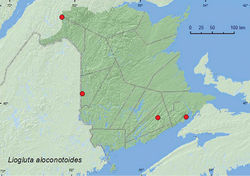Difference between revisions of "Liogluta aloconotoides"
m (Imported from ZooKeys) |
m (1 revision) |
(No difference)
| |
Latest revision as of 09:41, 26 April 2012
| Notice: | This page is derived from the original publication listed below, whose author(s) should always be credited. Further contributors may edit and improve the content of this page and, consequently, need to be credited as well (see page history). Any assessment of factual correctness requires a careful review of the original article as well as of subsequent contributions.
If you are uncertain whether your planned contribution is correct or not, we suggest that you use the associated discussion page instead of editing the page directly. This page should be cited as follows (rationale):
Citation formats to copy and paste
BibTeX: @article{Webster2012ZooKeys186, RIS/ Endnote: TY - JOUR Wikipedia/ Citizendium: <ref name="Webster2012ZooKeys186">{{Citation See also the citation download page at the journal. |
Ordo: Coleoptera
Familia: Staphylinidae
Genus: Liogluta
Name
Liogluta aloconotoides Lohse, 1990 – Wikispecies link – Pensoft Profile
Material examined
New Brunswick, Albert Co., Shepody N.W.A., Mary’s Point Section, 45.7320°N, 64.6765°W, 12.IX.2004, R. P. Webster, spruce forest, in dung (1 ♀, RWC). Carleton Co., Jackson Falls, “Bell Forest”, 46.2200°N, 67.7231°W, 12-19.VII.2008, R. P. Webster, rich Appalachian hardwood forest with some conifers, Lindgren funnel trap (1 ♂, RWC). Kings Co., Sussex, 3.VIII.1994 (J. Sweeney), pitfall control 3-3 (1 ♀, AFC). Madawaska Co., Loon Lake, 236 m elev., 47.7839°N, 68.3843°W, 21.VII.2010, R. P. Webster, boreal forest, small lake surrounded by sedges, treading sedges near Myrica gale bushes (1 ♂, 1 ♀, RWC).
Collection and habitat data
Klimaszewski et al. (2011)[1] reported this species from various forest types and on coastal limestone barrens in Newfoundland. Specimens from New Brunswick were collected from dung in a coastal red spruce forest, treading sedges along a small lake margin, from a Lindgren funnel trap deployed in a rich Appalachian hardwood forest with some conifers, and in a pitfall trap. Adults were collected during July, August, and September.
Distribution in Canada and Alaska
YT, ON, QC, NB, NS, LB, NF (Lohse et al. 1990[2]; Majka and Klimaszewski 2008[3]; Klimaszewski et al. 2008a[4]).
Taxon Treatment
- Webster, R; Klimaszewski, J; Sweeney, J; DeMerchant, I; 2012: New Staphylinidae (Coleoptera) records with new collection data from New Brunswick, and an addition to the fauna of Quebec, Canada: Aleocharinae ZooKeys, 186: 83-118. doi
Other References
- ↑ Klimaszewski J, Langor D, Pelletier G, Bourdon C, Perdereau L (2011) Aleocharine beetles (Coleoptera, Staphylinidae) of the province of Newfoundland and Labrador, Canada. Pensoft, Sofia-Moscow, 313 pp.
- ↑ Lohse G, Klimaszewski J, Smetana A (1990) Revision of arctic Aleocharinae of North America (Coleoptera: Staphylinidae). The Coleopterists Bulletin 44: 121-202.
- ↑ Majka C, Klimaszewski J (2008) New records of Canadian Aleocharinae (Coleoptera: Staphylinidae). In: Majka C Klimaszewski J (Eds). Biodiversity, Biosystematics, and Ecology of Canadian Coleoptera. ZooKeys 2: 85–114. doi: 10.3897/zookeys.2.7
- ↑ Klimaszewski J, Godin B, Pelletier G, Savard K (2008a) Six new species and records of aleocharine beetles from the Yukon and Alaska (Coleoptera: Staphylinidae: Aleocharinae). The Canadian Entomologist 140: 265-291. doi: 10.4039/n07-054
Images
|
